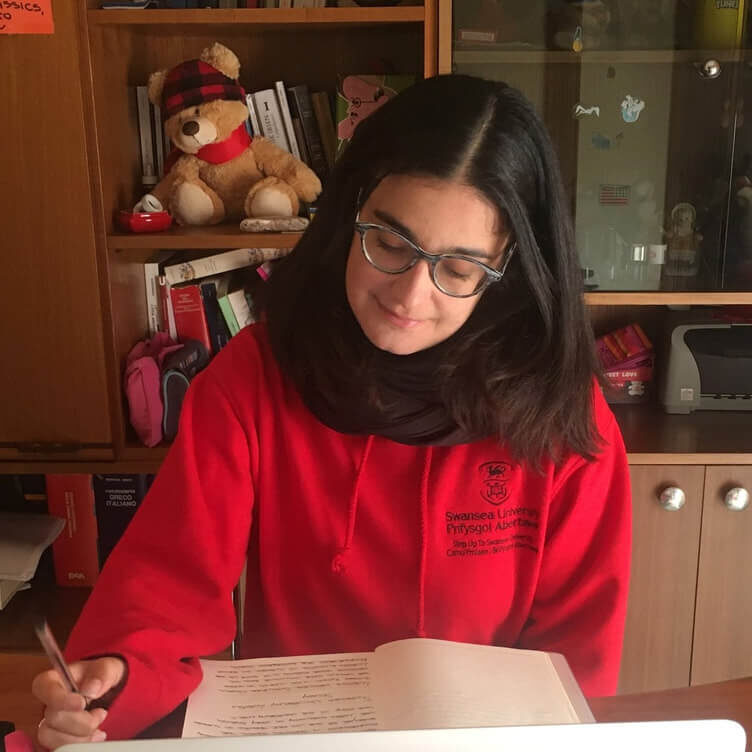My name is Marika Strano, I am 28 years old, and I am a first year PhD student in English Literature at Swansea University. It is very difficult for me to write this article and to make light of my “journey” as a PhD student because I don’t want to lie to you, it is not easy being a PhD student. The admissions process is even more difficult for international students, and my experience was no exception. So, let’s start from the beginning.
My journey began in Italy, my home country. After completing my master’s degree in Modern Philology, I decided to apply to the PhD program at my old university, the University for Foreigners of Perugia. I had found myself successful during my masters and I knew that staying here was a good choice both personally and academically. It would allow me to grow as a person and as a scholar, and I could also stay in Umbria. Umbria is one of the regions of Italy I love most: for the people I met there, for its culture and monuments, and above all, for its food!
Unfortunately, I didn’t pass the admissions exam. I was strongly discouraged by this and struggled to come to terms with not making it. I tried applying to other Italian universities from March to September 2020, while, as you well remember, we were all in lockdown. I received another 9 refusals. Yes, 9. At that point I was struggling so badly with my mental health and I felt like I was close to giving up. I questioned whether I still had it in me, that maybe I would never follow my dream. I felt that quitting was the best solution to give my poor mental health some peace. Three weeks later, I gave a presentation at Swansea University.
At this event I met two people to whom I owe a lot of thanks: Dr. Maria Pretzler, Associate Professor in Ancient History, and her PhD student – and now my colleague – Thomas Husoy, who each encouraged me to propose my project to some of the lecturers of the English department at Swansea University. Two days later I was scrolling on the university website to find out if any of the lecturers of the English department also had an interest in comparative literature, as my PhD project concerns the presence of Giacomo Leopardi, the most famous modern author in Italy, in the literary works of James Joyce (who doesn’t need any introduction!). I was lucky to come across the work of my (now) supervisor, Dr. Richard Robinson, Associate Professor in English Literature, who is also a comparativist. He is now co-editing a special issue of ‘Textual Practice on ‘The Contemporary Problem of Style’ with Dr Barry Sheils, in which they consider the intersection of style and dialect in the work of the Italian author Elena Ferrante. He was thrilled that I had made contact and was excited by my project. After a few months (and several corrections to my draft!), I was admitted to Swansea University.
March 11th 2021 was the best day of my life – the day I received my conditional offer! I still had to pass the IELTS exam, which is the English language test for study, migration, or work, but after receiving my offer, I finally saw my dream come true. Everything I had worked and studied so much for was finally materializing before my eyes.
There was one problem which still haunted me, and that was knowing that I would have to move away from Sicily, my region, and from Italy in general. Being an international student (since Brexit we are officially defined as international students) is not easy for a Sicilian, and it’s even harder for an Italian. I have met many foreign colleagues studying here in Swansea from lots of places like Slovenia, France, Spain and people from other regions of Italy. There are also lots of people from the USA, China, India, Giordania, and Africa. Talking to them I realized that they miss home as well, and it’s something that makes your time as an international student much harder.
I am writing this just a few days after visiting Sicily. As the plane took off from Palermo to London, I felt like my heart was shattering. It takes a while for me to feel normal again. It helps when I’m travelling around Swansea or going to university and I realize that life is here, but no place is like “my island in the sun”. Perhaps only Portuguese speakers will understand me when I use the word “saudade”, which indicates that deep nostalgia for home, for their place in the world. Neither Italian nor English have a translation for this term, but I think it encapsulates the way I feel perfectly.
Now I’d like to be honest and state that coming to study at Swansea University was the best chance I could have given myself in life. The United Kingdom (and especially Wales) has not only been a place where I can develop as a student and scholar, but it has also allowed me to feel free. Free to express my opinions and ideas at university (always with respect and kindness) without having to fear that someone will misinterpret you or take offence. You are able to speak freely without the level of reverence that you have to show in Italy, particularly when talking to lecturers! Whenever I write a chapter of my thesis, or simply go to a meeting with my supervisor, I feel that my work is respected; I feel appreciated and, even when I receive criticism or corrections, I know that they are not destructive or mean-spirited, but that they are made to allow me to improve and move forward with my work.
Furthermore, even though I am only in the first year of my PhD course, my university has given me the enormous opportunity of working as a teaching assistant and teaching Italian to a class of third years. Undertaking the responsibility of teaching for the first time has been one of the highlights of this academic year. Being able to speak my language with them and deal with important issues has helped me to recognise that grammar is not the most important aspect of teaching a foreign language. It has also taught me the importance of making mistakes and learning lessons from them. In the one semester that I have been teaching I feel I have grown a lot as an academic, and I hope that next semester I will be given the same opportunity.
While teaching this course, I have also met my mentor, Dr. Giovanna Donzelli, who become not just a great example for me as a teacher, but also as a person. It is inspiring getting to know Italian academics (my wonderful co-supervisor Dr. Roberta Magnani is also Italian), and thinking about all they have done before me helps me to move forward on my academic journey. I hope one that that I can live up to their example, to not only get through a PhD course, but a PhD course far away from Italy.
I would like to conclude this article offering advice to those who have felt the heartache, loneliness, and aimlessness of undertaking a PhD: don’t give up! We’re all in this together! Even if the road seems long and winding, we must follow the example of those who have been successful before us. And, as always, our motivation will carry us forward.
In bocca al lupo!




